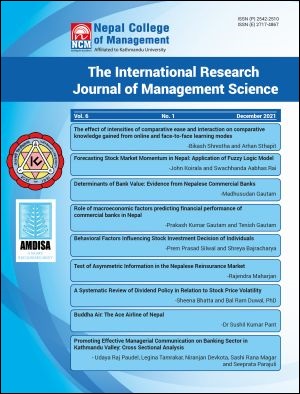Test of Asymmetric Information in the Nepalese Reinsurance Market
DOI:
https://doi.org/10.3126/irjms.v6i1.42340Keywords:
Asymmetric Information, Reinsurance, Insurance, Adverse Selection, Moral HazardAbstract
Background: The imperfect information can cause an imbalance of power which may lead to market failure thus collection of information is very essential in today’s business world therefore, the availability of the correct and accurate information is very crucial for making sound economic decisions. Thus, information asymmetry has been a very pertinent issue where economic transaction takes place insurance market is not far behind. As, reinsurance provides huge indirect capital to the insurance industry, providing correct information’s like premium earned, claim by the insurer to the reinsurer’s for fair pricing of reinsurance premium along ensuring top rated reinsurance company remain in Nepalese insurance industry.
Objectives: This study aims to examine whether there remains asymmetric information in Nepalese insurance market with reinsurer’s perspective in different portfolios such as fire, marine, motor, engineering and miscellaneous as well as combining all portfolio in aggregate.
Methods: The study uses descriptive and causal relation research design. Further, the study uses secondary data of 14 nonlife insurance from 2008/09 to 2018/19 with 168 firm year observations
Result: Results of the study revealed that that only in fire, marine and overall portfolios there exists strong asymmetric information. Rest of the portfolio like motor, engineering and miscellaneous there is no evidence of existence of asymmetric information.
Conclusion: Existence of asymmetric information is mostly an inevitable part as one party always tries to avoid information to others for the sake of benefit. However, the existence of asymmetric information to a large extent may lead to unhealthy relations between the parties and may bring the cold war distortion of relations. Thus, the finding of the studies is beneficial to the Nepalese nonlife insurers as insurers need to provide correct and accurate information to the reinsures
Implication: To cope with asymmetric information in the Nepalese insurance industry, this study provides strong evidence to provide correct and accurate information’s to the reinsurers else top rated reinsurers might withdraw their presence from the Nepalese market which will have adverse effect in the insurance industry.




